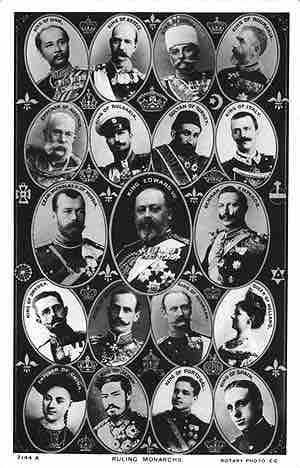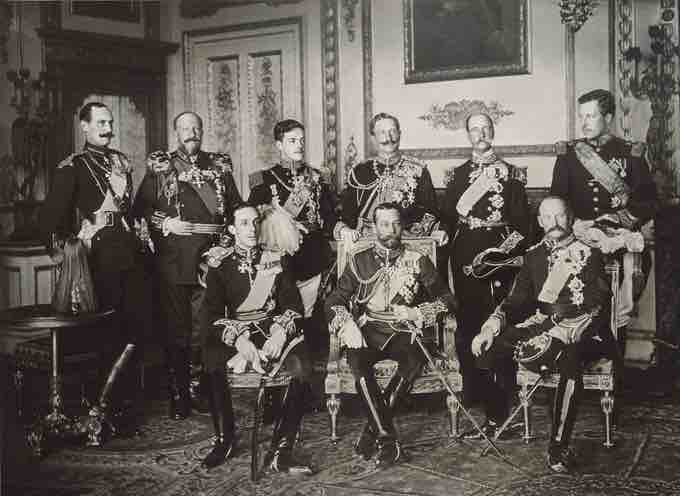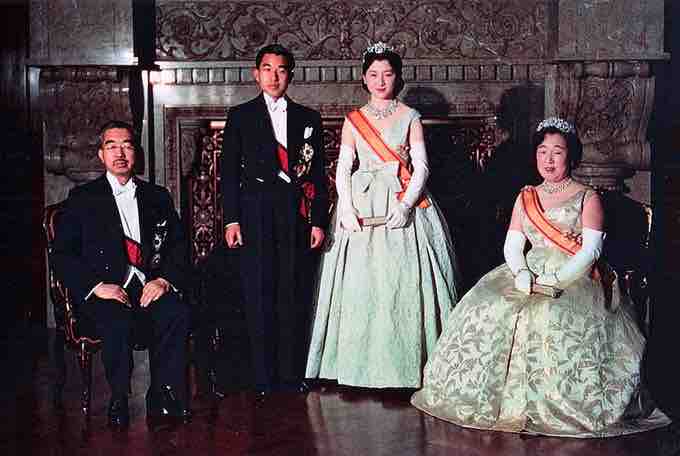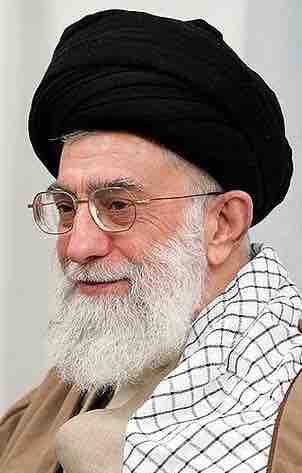Introduction
Governments tend to fall between traditionally democratic and non-democratic forms. These forms of government are usually distinguished based on who controls the state, how that authority is justified, and in what ways leaders and governments are structurally organized based on these justifications.
Monarchy
A monarchy is a form of government in which sovereignty is actually or nominally embodied in a single individual, the monarch. This is a form of government in which a state or polity is ruled or controlled by an individual who typically inherits the throne by birth and rules for life or until abdication. Monarchs may be autocrats (absolute monarchy) or ceremonial heads of state who exercise little or no power or only reserve power, with actual authority vested in a parliament or other body such as a constitutional assembly .

The decline of monarchy
Postcard of ruling monarchs, taken in 1908 between February (accession of King Manuel II of Portugal) and November (death of Guangxu Emperor).
Monarchs have various titles — king or queen, prince or princess, Malik or Malikah, emperor or empress, duke or grand duke, and Shah . Monarchy is associated with political or sociocultural hereditary rule; most monarchs, both historically and in the modern day, have been born and brought up within a royal family and trained for future duties. However, some monarchies are non-hereditary. In an elective monarchy, the monarch is elected but otherwise serves as any other monarch. Historical examples of elective monarchy include the Holy Roman Emperors and the free election of kings of the Polish–Lithuanian Commonwealth .

Monarchs
This photograph depicts the King of Norway, Bulgaria, Portugal, Greece, Belgium, and Denmark. In a monarchy, the state is controlled by an individual who usually inherits the throne by birth.

Crown Prince & Princess & Emperor Showa & Empress Kojun wedding 1959-4
Japanese Emperor Hirohito, Crown Prince Akihito, Crown Princess Michiko and Empress Nagako, 1959
Monarchies have existed throughout the world, although in recent centuries many states have abolished the monarchy and become republics. Advocacy of republics is called republicanism, while advocacy of monarchies is called monarchism. As of 2010 in Europe, there are twelve monarchies: seven kingdoms, one grand duchy, one papacy, and two principalities, as well as the diarchy of Andorra.
Oligarchy
Oligarchy is a form of power structure in which power effectively rests with a small number of people. These people could be distinguished by royalty, wealth, family ties, education, corporate, or military control. Such states are often controlled by a few prominent families who pass their influence from one generation to the next. Forms of government and other political structures associated with oligarchy usually include aristocracy, meritocracy, plutocracy, military junta, technocracy, and theocracy.
Aristocracy is a form of government in which a few elite citizens rule. In the origins in Ancient Greece, it was conceived of as rule by the best qualified citizens, and contrasted with monarchy. In later times, aristocracy was usually seen as rule by a privileged group, the aristocratic class, and contrasted with democracy. Similarly, plutocracy is rule by the wealthy. Unlike systems such as democracy, plutocracy is not rooted in a political philosophy and has no advocates; the term is only used in a pejorative sense. Examples of plutocracies include the Roman Republic, some city-states in Ancient Greece, the civilization of Carthage, the Italian city-states/merchant republics of Venice, Florence, Genoa, and pre-World War II Empire of Japan zaibatsu.
Other Forms of Governance
Technocracy is a form of government in which experts in technology would be in control of all decision making. Scientists, engineers, and technologists who have knowledge, expertise, or skills, would compose the governing body instead of politicians, businessmen, and economists. In a technocracy, decision makers would be selected based upon how knowledgeable and skillful they are in their field.
Theocracy is a form of government in which official policy is governed by immediate divine guidance or by officials who are regarded as divinely guided, or is pursuant to the doctrine of a particular religion or religious group . Theocracy essentially means rule by a church or analogous religious leadership; a state in which the goal is to direct the population towards God and in which God himself is the theoretical "head of the state".

Iran's Theocracy
Iran is an example of a theocracy. Ali Khamenei, depicted here, current holds the position of Supreme Leader in Iran. The Supreme Leader is a religious figure who has arguably the most political power in Iran.
An Islamic state is a state that has adopted Islam, specifically Sharia (Islamic Law), as its foundations for political institutions, or laws, exclusively, and has implemented the Islamic ruling system and is therefore a theocracy. Although there is much debate as to which states or groups operate strictly according to Islamic Law, Sharia is the official basis for state laws in the following countries: Yemen, Afghanistan, Somalia, Sudan, Saudi Arabia, Mauritania, Oman and Iran.